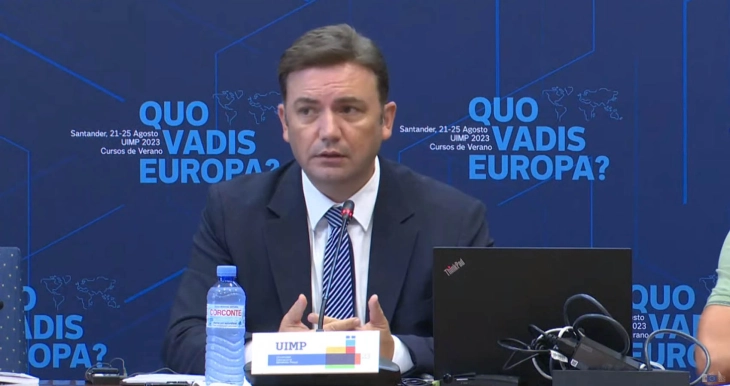Osmani: Enlargement with Western Balkan countries by 2030 - a top security priority for EU
- A united and prosperous Europe in peace can only be achieved with a united and prosperous Western Balkans in peace. In that sense, this is a rare case of an obvious common interest both for the EU and the Western Balkans. Politically, economically and culturally, even geographically, we are in the same boat. Defining a clear path for future enlargement with the Western Balkan countries by 2030 as a set goal represents a top priority for the EU itself, said Minister of Foreign Affairs Bujar Osmani in an address Tuesday at the “Quo vadis Europe?” summer course in Santander, Spain, organized by the High EU Representative for Foreign Affairs and Security Policy, Josep Borrell, and the Menéndez Pelayo International University.
- Post By Angel Dimoski
- 14:05, 22 August, 2023

Skopje, 22 August 2023 (MIA) – A united and prosperous Europe in peace can only be achieved with a united and prosperous Western Balkans in peace. In that sense, this is a rare case of an obvious common interest both for the EU and the Western Balkans. Politically, economically and culturally, even geographically, we are in the same boat. Defining a clear path for future enlargement with the Western Balkan countries by 2030 as a set goal represents a top priority for the EU itself, said Minister of Foreign Affairs Bujar Osmani in an address Tuesday at the “Quo vadis Europe?” summer course in Santander, Spain, organized by the High EU Representative for Foreign Affairs and Security Policy, Josep Borrell, and the Menéndez Pelayo International University.
In the discussion of enlargement and neighborhood, focused on the Western Balkans and its EU path, Osmani touched upon the increased emphasis on the importance of EU enlargement, stressing that there is a consensus among the countries of the region and the EU member states that “it is still not enough.”
“Twenty years after the Thessaloniki Summit, we urgently need a midterm vision for our region within the Union,” underlined the Minister.
The diplomacy chief noted he understands the “complexity of the conditions in which the EU functions, the EU’s doubts over enlargement, the need to deepen before it enlarges, to adjust the decision-making process before it accepts new members from the Western Balkans.”
“We believe that these two processes are complementary. The EU’s preparation for enlargement should go hand in hand with the Western Balkan countries’ preparation for accession. We need to harmonize these processes, to link them. Convinced that there is no alternative to the EU membership of the Western Balkans, what we need now is to maintain the credibility of the process because currently there is a gap between the promises made by the EU at the Thessaloniki Summit 20 years ago that the Western Balkans will become a member of the EU, as a result of which the process is becoming less attractive and vulnerable to external influences such as the Russian influence in the region. This is why we propose that the concept of greater integration ahead of membership is introduced, not as an alternative to membership, but as an interstage through which we will pass on the path to full-fledged membership. Once the Western Balkan countries become a part of the system of European values, EU accession will only be a formality,” said Osmani.

In the context of the importance of the Western Balkans, Osmani pointed to a map where the region is depicted as an island surrounded by the “sea of the EU,” a missing piece of the puzzle, he said, for a complete Europe.
“Geographically, it is impossible to put the region aside. This leads us to believe that the EU will not be a complete, peaceful, sustainable project without the integration of the Western Balkans. Six countries which together in terms of territory are smaller than Romania, with a population of only 18 million, with less than 1 percent of the EU’s GDP and less than 4 percent of the EU’s population,” said Osmani.

Touching upon the need for concrete benefits for the citizens on the path to EU membership, Osmani welcomed the new Western Balkans growth plan proposed by the President of the European Commission, Ursula von der Leyen, founded on “our concept of greater integration ahead of membership.”
“Until our complete accession, we need a bolstered vision alongside tangible and realistic steps in the meantime in order to promote democratic development, improve economic opportunities and encourage reconciliation in the Western Balkans. This includes an increase in the pre-accession funds, progressive access to the single market, deepening of regional economic integration, removal of quotas for agricultural products and the inclusion of the countries of the region in the EU’s trade and investment policies,” said Osmani.
Photo: Printscreen







